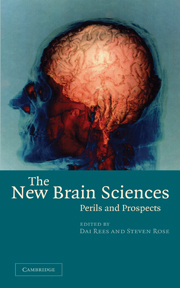Book contents
- Frontmatter
- Contents
- List of contributors
- Part I Introduction: the new brain sciences
- Part II Freedom to change
- Part III Neuroscience and the law
- Part IV Stewardship of the new brain sciences
- 10 The neurosciences: the danger that we will think that we have understood it all
- 11 On dissecting the genetic basis of behaviour and intelligence
- 12 Prospects and perils of stem cell repair of the central nervous system: a brief guide to current science
- 13 The use of human embryonic stem cells for research: an ethical evaluation
- 14 The Prozac story
- 15 Psychopharmacology at the interface between the market and the new biology
- 16 Education in the age of Ritalin
- Part V Conclusion
- References
- Index
16 - Education in the age of Ritalin
Published online by Cambridge University Press: 08 August 2009
- Frontmatter
- Contents
- List of contributors
- Part I Introduction: the new brain sciences
- Part II Freedom to change
- Part III Neuroscience and the law
- Part IV Stewardship of the new brain sciences
- 10 The neurosciences: the danger that we will think that we have understood it all
- 11 On dissecting the genetic basis of behaviour and intelligence
- 12 Prospects and perils of stem cell repair of the central nervous system: a brief guide to current science
- 13 The use of human embryonic stem cells for research: an ethical evaluation
- 14 The Prozac story
- 15 Psychopharmacology at the interface between the market and the new biology
- 16 Education in the age of Ritalin
- Part V Conclusion
- References
- Index
Summary
Attention deficit/hyperactivity disorder (AD/HD) is a medical diagnosis applied to children and adults who are experiencing characteristic behavioural and cognitive difficulties in important aspects of their lives, for example in familial and personal relationships at school or work. The diagnosis attributes these difficulties to problems of impulse control, hyperactivity and inattention. It is claimed that these problems are caused primarily by dysfunctions in the frontal lobes of the brain and that there are predisposing genes. Currently the diagnosis is claimed to relate to between 2% and 5% of all children of compulsory school age in England and Wales.
THE DIAGNOSIS OF AD/HD
In 1968 the American Psychiatric Association (APA) produced the first standardised set of criteria for what was then called hyperkinetic reaction of childhood. This gave way in 1980 to attention deficit disorder with hyperactivity (ADDH), which was revised in 1987 to attention deficit disorder (ADD). A subsequent revision (American Psychiatric Association, 1994) produced the current diagnostic criteria for attention deficit/hyperactivity disorder (AD/HD). These changes in nomenclature reflect changing conceptualisations of the nature of the condition, with a shift away from an emphasis on causation to a continuing emphasis on behavioural symptoms as the defining characteristics of the condition. According to the APA, children with AD/HD fall into one of three main subtypes: predominantly inattentive and distracted, predominantly hyperactive–impulsive, and combining hyperactivity with inattention and distractibility.
- Type
- Chapter
- Information
- The New Brain SciencesPerils and Prospects, pp. 249 - 262Publisher: Cambridge University PressPrint publication year: 2004
- 3
- Cited by



